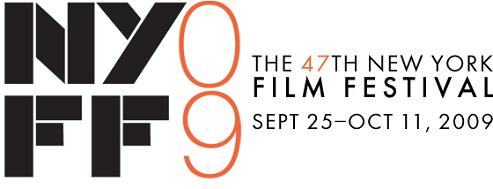
Click here for detailed program information.
Precious: Based on the Novel "Push" by Sapphire (*Centerpiece*)
Directed by Lee Daniels.

In 1987, Claireece “Precious” Jones (Gabourey 'Gabby' Sidibe), a morbidly obese 16-year-old African American girl, lives in Harlem with her physically and emotionally abusive mother, Mary (Mo’Nique). Claireece not only has to deal with the second pregnancy by her absent father who raped her, but the fact that she’s illiterate and feels like a loner. She gets the chance to brighten her future when the opportunity arises to enroll in an alternative school, Each One/ Teach One, after her school principal Mrs. Lichenstein (Nealla Gordon) kicks her out of school when she learns that she’s pregnant. At her new school, she develops a special bond with her literacy teacher, Ms. Rain (Paula Patton), and receives guidance from a social worker, Mrs. Weiss (Mariah Carey). Director Lee Daniels includes a well-chosen soundtrack, appropriately gritty cinematography and expert editing that’s quite stylish and enhances the overall melancholic mood. The screenplay by Geoffrey Fletcher has so many moving and heartbreaking moments which tug at your heart that you’ll find it easy to forgive the few scenes that feel forced and contrived as well as the plot’s formulaic threads that would have made you roll your eyes otherwise. Claireece moves along through her hardships without being fleshed out enough as a character so that you can grasp precisely what she’s thinking and feeling through her eventual transformation. Nevertheless, Gabourey ‘Gabby” Sidibe a raw, utterly convincing breakthrough performance which helps you to truly care about Claireece and be emotionally invested in her troubled life as she tries to improve herself. It’s universally inspiring to observe how she finds the courage to overcome her many obstacles. Concurrently, Mo’Nique nails the performance as Claireece’s mother with so much conviction that you really feel angry toward her abusive behavior. She’s a very bad mother, wife and person in general, but she also has a lot of emotional baggage that she carries with her. In one particularly unforgettable scene, she gives a powerful soliloquy that will not only bring tears to your eyes, but also, perhaps, lead to an Oscar nomination for Mo’Nique. At a running time of 1 hour and 49 minutes, Precious manages to be an inspirational, emotionally devastating drama that occasionally veers toward contrived melodrama , but remains captivating thanks to the raw, heartfelt performances by Mo’Nique and Gabourey ‘Gabby” Sidibe. Number of times I checked my watch: 1 Released by Lionsgate. Opens limited in New York, Chicago, Los Angeles and Atlanta. Expands on November 13th and 20th. 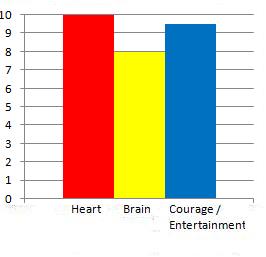
Broken Embraces (*Closing Night Film*)
Directed by Pedro Almodovar.
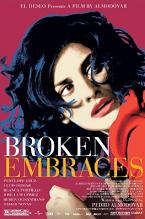
Broken Embraces
Directed by Pedro Almodóvar.

In Spanish with subtitles. Harry Caine (Lluis Homar), a blind screenwriter, had directed the film Girls and Suitcases 14 years earlier when he was known by his real name, Mateo Blanco. Since then, he hasn’t directed and, instead, lives off of the income generated from selling screenplays that he writes with the help of his assistant, Diego (Tamar Novas), and Judit (Blanca Portillo), Diego’s mother. After Harry learns of the death of Ernesto Martel (Jose Luis Gomez), the producer of Girls and Suitcases, Ernesto’s son, who introduces himself as Ray X (Ruben Ochandiano), shows up at his door in hopes of collaborating with him on writing a screenplay. One day, Diego has an accident and Harry takes care of him without notifying Judit. Diego inquires about Harry’s past when he was known as Mateo Blanco and had a love triangle with Lena (Penelope Cruz), the star of Girls and Suitcases, and Ernesto. Writer/director Pedro Almodóvar combines melodrama, romance, suspense and comedy with mixed results. As the intricate plot jumps back and forth between past and present, more and more twists pile up that change your perspective about certain characters and gradually reveal their true motivations, which won’t be revealed here. Harry’s past along with the circumstances that led up to his car crash are both intriguing and add a little bit of suspense. However, when the plot veers toward comedy and romance, that’s where it falls flat for the most part. Harry and Lena don’t really have any palpable chemistry during their scenes together and the same can be said for Lena and Ernesto, so the love triangle between the three simply fails to hold your attention. Penelope Cruz sizzles as the sexy Lena and performance is quite lively and engaging. It’s also worth mentioning that Almodóvar includes exquisite cinematography and does a decent job of maintaining the plot’s coherence amidst all of the flashbacks and twists which could have easily been confusing and head-ache inducing with a less skillful writer/director. At a running time of 2 hours and 8 minutes, Broken Embraces manages to be intriguing, well-structured and mildly engaging with strong performances, it’s balance of comedy, melodrama and romance feels slightly uneven and contrived. Number of times I checked my watch: 3 Released by Sony Pictures Classics. Opens November 20th, 2009 at the Landmark Sunshine Cinema and Lincoln Plaza Cinemas. 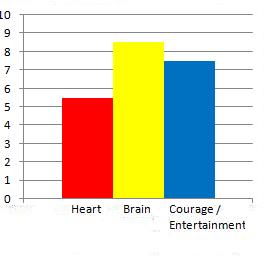
Wild Grass (*Opening Night Film*)
Directed by Alain Resnais.
 Number of times I checked my watch: 3
Number of times I checked my watch: 3
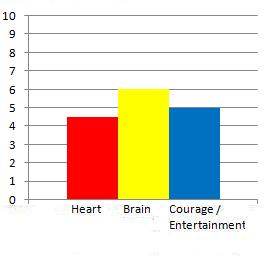 Released by Sony Pictures Classics.
Opens June 25th, 2010 at the Quad Cinema and Lincoln Plaza Cinemas.
Released by Sony Pictures Classics.
Opens June 25th, 2010 at the Quad Cinema and Lincoln Plaza Cinemas.
Antichrist
Directed by Lars von Trier.
 A mother (Charolotte Gainsbourg) grieves over the accidental death of her baby, who crawled through an open window and fell on a snowy night while she and her husband (Willem Dafoe) were having sex in another room. After she leaves the hospital while still depressed, her husband takes her off her medication and, in hope of healing their troubled marriage, convinces her to come along with him to the place that she fears the most: Eden, a cabin located deep in the woods where she had once spent alone with her son. Both of them gradually become mentally deranged and twisted in Eden as strange events occur around them, such as a fox that talks and a deer unaware that it has a stillborn fawn dangling from its womb. Without revealing any of the viscerally shocking moments, it’s safe to mention that most of them occur during the last 20 minutes of the film. The prior scenes feel relentlessly disturbing on a very psychological level. Writer/director Lars von Trier has a lot of courage for deviating from a standard, easy-to-swallow narrative structure and character development. He doesn’t even try to make the husband and wife likable nor does he give them names or provide you with a backstory about how exactly they had met and fallen in love with each other to begin with. There’s no denying that the stylish cinematography, lighting design and set design all richly enhance the dreamlike and eerie atmosphere throughout the film in a way that gives you a foreboding feeling that something catastrophic might happen at any given moment. Can visuals be ugly and oddly beautiful concurrently? At times, it seems so. Trier uses so many symbolic images and biblical allusions that some might consider the bombardment of stylish visuals to cross the line from artsy and clever to merely pretentious and tedious; others will be fascinated by the rich, provocative and meticulous attention to detail. At a running time of 105 minutes, Antichrist manages to be a psychologically horrifying, fascinating and emotionally devastating experience that should be studied, analyzed and discussed scene-for-scene by film buffs for its brilliant, stylish production values, allegories and allusions. Number of times I checked my watch: 2
A mother (Charolotte Gainsbourg) grieves over the accidental death of her baby, who crawled through an open window and fell on a snowy night while she and her husband (Willem Dafoe) were having sex in another room. After she leaves the hospital while still depressed, her husband takes her off her medication and, in hope of healing their troubled marriage, convinces her to come along with him to the place that she fears the most: Eden, a cabin located deep in the woods where she had once spent alone with her son. Both of them gradually become mentally deranged and twisted in Eden as strange events occur around them, such as a fox that talks and a deer unaware that it has a stillborn fawn dangling from its womb. Without revealing any of the viscerally shocking moments, it’s safe to mention that most of them occur during the last 20 minutes of the film. The prior scenes feel relentlessly disturbing on a very psychological level. Writer/director Lars von Trier has a lot of courage for deviating from a standard, easy-to-swallow narrative structure and character development. He doesn’t even try to make the husband and wife likable nor does he give them names or provide you with a backstory about how exactly they had met and fallen in love with each other to begin with. There’s no denying that the stylish cinematography, lighting design and set design all richly enhance the dreamlike and eerie atmosphere throughout the film in a way that gives you a foreboding feeling that something catastrophic might happen at any given moment. Can visuals be ugly and oddly beautiful concurrently? At times, it seems so. Trier uses so many symbolic images and biblical allusions that some might consider the bombardment of stylish visuals to cross the line from artsy and clever to merely pretentious and tedious; others will be fascinated by the rich, provocative and meticulous attention to detail. At a running time of 105 minutes, Antichrist manages to be a psychologically horrifying, fascinating and emotionally devastating experience that should be studied, analyzed and discussed scene-for-scene by film buffs for its brilliant, stylish production values, allegories and allusions. Number of times I checked my watch: 2
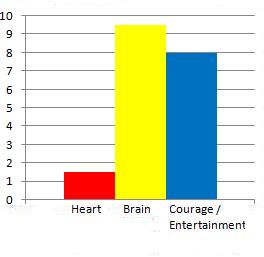 Number of times I checked my watch: 2
Released by IFC Films.
Opens October 23rd, 2009 at the IFC Center.
Number of times I checked my watch: 2
Released by IFC Films.
Opens October 23rd, 2009 at the IFC Center.
Around a Small Mountain
Directed by Jacques Rivette.
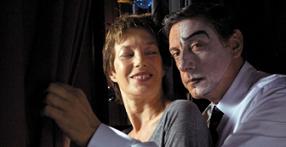
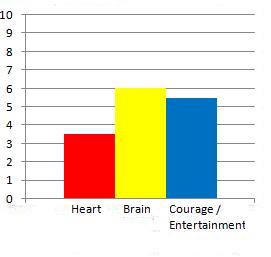 Number of times I checked my watch: 4
Released by IFC Films.
Opens July 9th, 2010 at the IFC Center.
Number of times I checked my watch: 4
Released by IFC Films.
Opens July 9th, 2010 at the IFC Center.
The Art of the Steal
Directed by Don Argott. This fascinating and suspenseful documentary charts the dramatic events that occurred when politicians along with art institutions struggled to move the Barnes Foundation from the small suburb of Merion, Pennsylvania all the way to the city of Philadelphia, against the wishes of its founder’s will. At the age of 50, Dr. Albert C. Barnes had already collected a variety of early Modern and Post-Impressionist paintings ranging from works by Picasso, Monet, Renoir, Cezanne, Matisse and Van Gogh, among others, with a cumulative value of over $25 billion today. He displayed the paintings in a small museum outside of Philadelphia specifically so that everyday people who aren’t so accustomed to viewing artworks would get the chance to do so. Moreover, he looked down upon the elitist art critics who considered his art collection to be nothing more than junk. When he died in a car accident back in 1951, he stated clearly in his will that Lincoln University ought to have control over the Barnes Foundation and the painting ought to stay at its small museum in Merion no matter what. The Foundation’s endowment was mishandled throughout the years, leaving the Foundation vulnerable for other institutions to purchase and move it to another location in an attempt to save the collection. Director Don Argott looks at many different sides of the issue by interviewing former attorney general Mike Fisher, former Barnes president Richard Glanton as well as friends of Barnes, among others, who shed light from their perspective. You might find it a little difficult to assess the moral implications of moving of the Barnes Foundation objectively because the film’s title directly states that what’s occurring is a theft of art. In reality, though, the issue of the theft has a lot of grey area and it’s somewhat exciting to watch the footage of the desperate battle to respect Barnes’ wishes. No matter which side of the issue you choose to lean toward, you’ll probably feel enraged at how this microcosm of greed, lack of appreciation for an art collector’s wishes, and simple-mindedness about the art can lead to corruption with the help of politicians, not surprisingly, and a cross of moral boundaries. Ultimately, The Art of the Steal manages to be a thoroughly compelling, well-edited and riveting documentary that finds just the right balance between entertaining the audience and provoking them intellectually.
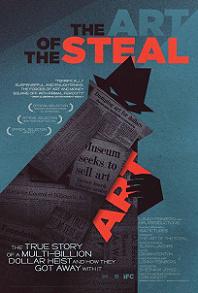
Number of times I checked my watch: 0 Released by IFC Films. Opens February 26th, 2010 at the IFC Center and Lincoln Plaza Cinemas. 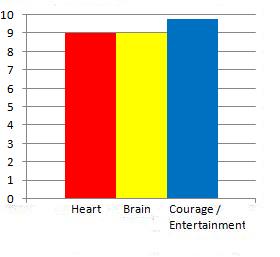
Everyone Else
Directed by Maren Ade.
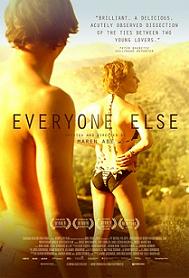
In German and Italian with subtitles. Gitti (Birgit Minichmayr) and her boyfriend, Chris (Lars Eidinger), spend their holiday vacation at the villa of Chris’ parents in Sardinia, Italy. He works as an architect and she’s a publicist for a rock band. At least for a while, they seem like a normal, happy couple who love one another affectionately, but there’s much more to their relationship than meets the eye. Their vacation place looks so serene and picturesque that you’ll probably wonder whether some kind of event, perhaps a sinister one, might stir things up a bit and startle the tranquility. Writer/director Maren Ade doesn’t provide you with a wealth of information about the lives of Gitti and Chris because she trusts that you, the audience, is intelligent enough to gather the bits and pieces of details along the way and, most importantly, to pay close attention to their conversations. Ade achieves a quietly absorbing sense of realism by unfolding their relationship so gradually and organically. You may not find yourself liking neither of the two, but at least they come across as complex, sensitive human beings. When Gitti and Chris meet another couple, Sana (Nicole Marischka) and Hans (Hans-Jochen Wagner), the dynamics of their relationship unravel even further and, in uncontrived ways, you notice them growing apart more rapidly from one another. Will they be able to patch up their relationship or is it completely hopeless for them? In reality, relationships take a lot of work and, fortunately, Maren Ade shows that she understands that because the answer to that question isn’t quite as simple and easy as you think it is. Even when Gitti behaves bizarrely or does something unexpected, her actions always uncover a new layer of her relationship with Chris while keeping you intrigued to continue discovering and peeling more layers. At a running time of 2 hours, Everyone Else manages to be quietly absorbing, mature and unpretentious with well-nuanced performances and lush cinematography.Number of times I checked my watch: 1 Released by The Cinema Guild. Opens April 9th, 2010 at the IFC Center. 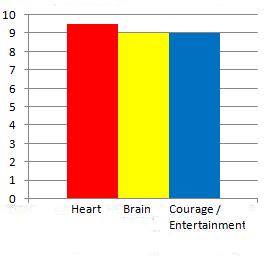
Hadewijch
Directed by Bruno Dumont.

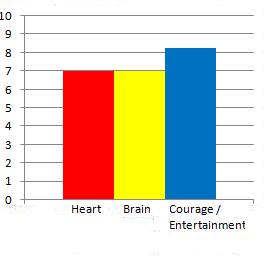 Number of times I checked my watch: 2
Released by IFC Films.
No release date, yet.
Number of times I checked my watch: 2
Released by IFC Films.
No release date, yet.
Lebanon
Directed by Samuel Maoz.

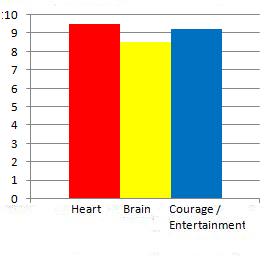 Number of times I checked my watch: 1
Released by Sony Pictures Classics.
No release date, yet.
Number of times I checked my watch: 1
Released by Sony Pictures Classics.
No release date, yet.
Mother
Directed by Bong Joon-ho.

In Korean with subtitles. Yoon Hye-Ja (Kim Hye-ja), lives in a small Korean town with her mentally retarded son, Do-joon (Won Bin), and works as an acupuncturist/herbalist. Do-Joon and his good friend, Jin-tae (Jin Ku), hunt down and beat up a bunch of guys responsible for crashing their car into theirs in a hit-and-run accident. Afterwards, in an unrelated incident, the police arrest Do-Joon and implicate him for the murder of a teenage girl whose body was found slumped over a wall as if it were dirty laundry. His mother believes that he’s innocent even though the police remain utterly convinced that he’s the murderer, so she does everything in her abilities to find the real killer to prove the police wrong. Is Do-joon innocent or his is mother jumping to conclusions based on her motherly love? Director/co-writer Bong Joon-ho , who previously directed The Host, wisely chooses not to show the murder taking place until the very revealing third act. Until that point, though, you’ll find yourself at the edge of your seat as you wonder what precisely happened and why. Kim Hye-ja delivers a raw, brave performance as the mother that’s filled with just the right balance of anger, frustration and fragility. She’s a character worth rooting for because she’s smart, tough and deeply loves her son. The extent to which she goes to protect him won’t be spoiled here, though. Joon-ho creates a very intense atmosphere throughout the film that never lets go of its grip---the mood occasionally veers a bit toward creepiness, making you feeling as if you were watching a horror film. It’s also worth mentioning the surprising touch of comic relief which lightens the mood while offsetting the darker, heavier tones. The last half-hour has so many clever twists that you might find your head spinning around, but you’ll never feel cheated or roll your eyes because the twists are all character-driven and transpire logically by the internal mechanisms of the plot rather than as cheap gimmicks. At a running time of 2 hours and 8 minutes, Mother manages to be a riveting, intelligent and engrossing murder-mystery boasting an unforgettably brave and captivating performance by Kim Hye-ja.
Number of times I checked my watch: 0 Released by Magnolia Pictures. Opens March 12th, 2010 at the IFC Center and Lincoln Plaza Cinemas. 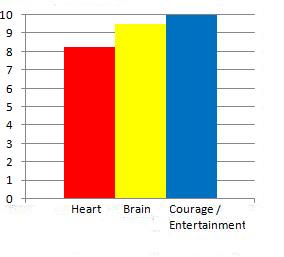
Police, Adjective
Directed by Corneliu Porumboiu.
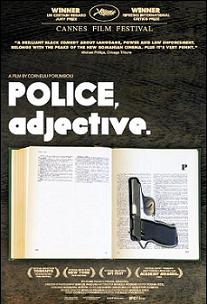
In Romanian with subtitles. Cristi (Dragos Bucur), an undercover policeman, follows a teenager, Alex (Alexandru Sabadac), an informer who tipped him about his two friends, Doina (Anca Diaconu) and Victor (Radu Costin), who he hangs out with while smoking weed. Victor supplies Alex with the weed, but Cristi eventually learns that Victor’s currently absent brother might be the one whom Victor gets the drugs from. When Cristi isn’t surveilling and staking out Alex, Victor and Doina from a distance, he’s smoking cigarettes or eating a meal at home that his new wife, Anca (Irina Saulescu), had prepared for him. Back at the police station, his boss, Nelu (Ion Stoica), asks him to speed up the investigation which he has worked on for over a week already. Cristi prefers to take his time gathering more information to find the accurate origins of the drugs because he doesn’t think it would be fair to arrest Victor right away given that he’s not the drug dealer; he’s merely an irresponsible teenager who smokes weed. Merely offering someone else drugs is considered unlawful and punishable with prison time, but it turns out that this particular law will be nullified soon in Romania just like it has already been throughout the rest of Europe where it’s not a crime. Writer/director Corneliu Porumboiu, who previously directed the deadpan comedy 12:08 East of Bucharest, moves the plot along at a very relaxed pace that enhances the cinema verité style of cinematography. Admittedly, it does take a while to get accustomed to that slow pace during the first and second acts which have minimal dialogue, but patient viewers will be rewarded by a 15-minute third act that’s driven by witty and dryly funny dialogue, none of which will be spoiled here. It’s worth mentioning, though, that the film becomes quietly thought-provoking once you realize that Cristi is in the process of battling with his moral conscience as a human being versus his required and expected duties as an officer of the law. At a running time of 1 hour and 50 minutes, Police, Adjective manages to be a leisurely paced, gently engrossing crime drama with an exceptionally witty and thought-provoking finale. Number of times I checked my watch: 1 Released by IFC Films. Opens December 23rd, 2009 at the IFC Center and Lincoln Plaza Cinemas. 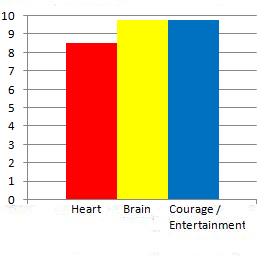
Vincere
Directed by Marco Bellocchio.
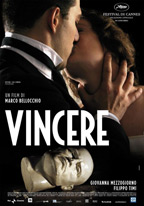
In Italian and German with subtitles. Ira Dalser (Giovanna Mezzogiorno) meets Benito Mussolini (Filippo Timo) back in 1907, before his rise to power as Italy’s fascist dictator, and immediately falls in love with him. After working as an editor of the Socialist newspaper Avanti!, Mussolini starts his own newspaper, Il Popolo d’Italia, which helps to fuel the birth of the forthcoming Fascist Party. By then, Ira has become his wife and bears his child, Benito Albino. She loves his so dearly that she sold most of her possessions to finance Mussolini’s newspaper. However, he neglects her as his wife and goes off into the battle once World War I begins. Upon his return, he lays wounded in a military hospital bed and, when Ira visits him, she learns that he has a new wife, Rachele (Michela Cescon) and a five-year-old daughter. It’s at this point that the film veers into dramatic thriller territory as Ida is forced to be imprisoned in an asylum and to be separated from her son even though that she repeatedly asserts that she’s truly Mussolini’s wife. The marriage documents cannot be found and she remains incarcerated there for eleven years while desperately trying to prove that he’s her husband which. Giovanna Mezzogiorno delivers a brave, convincingly moving performance as Ida. She’s the heart and soul of the film and radiates so much warmth, charisma and tenderness that all help to make her character easy to care about as a sensitive, passionate, loyal, persistent, courageous yet fragile human being. The screenplay by director/co-writer Marco Bellocchio deftly combines drama, suspense and intrigue with great attention to detail that makes for a very illuminating and captivating experience, especially for attentive audience members. Bellocchio also includes very stylish cinematography that invigorates the film with plenty of flair. Vincere isn’t one of those pedestrian, bland period pieces with merely great costume/set designs---instead, it has both style and substance while remaining engaging from start to finish. At a running time of 2 hours and 8 minutes, Vincere is captivating, taut, absorbing and invigorating with exquisitely stylish cinematography and a mesmerizing, tour de force by Giovanna Mezzogiorno. Number of times I checked my watch: 0 Released by IFC Films. Opens March 19th, 2010 at the IFC Center and Lincoln Plaza Cinemas. 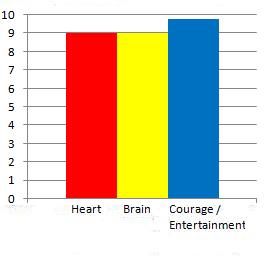
White Material
Directed by Claire Denis.
 Maria Vial (Isabelle Huppert) owns a coffee plantation in Africa where there’s social unrest and violence taking place all around the country. She desperately tries to save the plantation from being destroyed even while a rebel leader known as the Boxer (Isaach de Bankolé ) reemerges and as child soldiers remain a threat to the life of her family, including her ex-husband, André (Christopher Lambert) and son (Nicolas Duvauchelle). André secretly made a deal with the mayor (William Nadylam) to sell him the plantation. Director/co-writer Claire Denis has woven a drama that’s initially intriguing and intense, but it eventually becomes tedious and unmoving because she fails to draw you emotionally into the life of the characters. Isabelle Huppert gives a strong performance, just as expected, which helps to keep you at least marginally engaged, but by the time the end credits roll, you’ll feel rather underwhelmed and wishing that the film were much more riveting and insightful while characters were much more organically fleshed out.
Maria Vial (Isabelle Huppert) owns a coffee plantation in Africa where there’s social unrest and violence taking place all around the country. She desperately tries to save the plantation from being destroyed even while a rebel leader known as the Boxer (Isaach de Bankolé ) reemerges and as child soldiers remain a threat to the life of her family, including her ex-husband, André (Christopher Lambert) and son (Nicolas Duvauchelle). André secretly made a deal with the mayor (William Nadylam) to sell him the plantation. Director/co-writer Claire Denis has woven a drama that’s initially intriguing and intense, but it eventually becomes tedious and unmoving because she fails to draw you emotionally into the life of the characters. Isabelle Huppert gives a strong performance, just as expected, which helps to keep you at least marginally engaged, but by the time the end credits roll, you’ll feel rather underwhelmed and wishing that the film were much more riveting and insightful while characters were much more organically fleshed out.
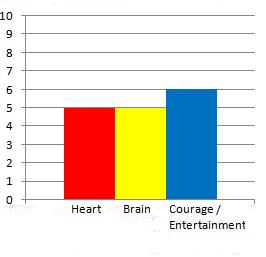 Number of times I checked my watch: 4
Released by IFC Films.
No release date yet.
Number of times I checked my watch: 4
Released by IFC Films.
No release date yet.
The White Ribbon
Directed by Michael Haneke.
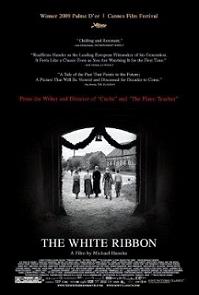
In German with subtitles. In 1913, a year before World War I commences, a series of mysterious, tragic events plague Eichwald, a small, rural village in Germany. The village doctor (Rainer Bock) became seriously injured after falling down from his horse as it crossed a path that had a wire that caused it to trip. Who placed the wire there? What might be their motivation(s)? Adding to the mystery, no one can find the wire that supposedly was there. While the doctor recuperates in another village, Mrs. Wagner (Susanne Lothar), the midwife and mother of Karli (Eddy Grahl), takes care of his children, Anna (Roxane Duran) and younger brother, Rudolph (Miljan Chatelain). Klara (Maria-Victoria Dragus) and Martin (Leonard Proxauf), the children of the village’s Protestant pastor (Burghart Klaussner), offer to keep Anna and Rudolph company. A farmer’s wife dies after falls through the rotten floorboards of a sawmill belonging to the farmer’s boss, the Baron (Ulrich Tukur), and, soon enough, the blame is placed on the Baron for the “accident”. Someone beats up Baron’s son, Sigi (Fion Mutert), in retaliation for that event. In another subplot, the new local schoolteacher (Christian Friedel) courts Eva (Leonie Benesch), the 17-year-old nanny at the Baron’s estate. Writer/director Michael Haneke has woven a very intricate and elliptical mystery drama that, at times, feels psychologically horrifying because you never really know what kind of tragic event will occur next or who/whom should take the blame for that matter. He builds the tension very gradually and wisely doesn’t spoon-feed revealing information about the mystery to the audience. The tragic events themselves aren’t displayed onscreen, so there’s always more questions than answer. In turn, you’ll be questioning the true motive(s) of each character, even the seemingly innocent ones. Should you trust the narrator (voice of Ernst Jacobi), the older version of schoolteacher speaking to the audience from years later? Attentive audience members should pay close attention to the pastor’s dialogue, especially when he talks to his children about the loss of innocence and purity, enhancing the meaning of the film’s allegoric title. Each of the child actors gives a compelling performance which will make you forget that this actually marks their feature film debut. Haneke also leaves out a musical score and includes a lush, hauntingly beautiful black-and-white cinematography with so much visual richness that every scene could easily be paused, admired and studied as if it were a painting. At a running time of 2 hours and 24 minutes, The White Ribbon manages to be engrossing, suspenseful and quietly haunting with exquisite cinematography and meticulous attention to detail. Number of times I checked my watch: 0 Released by Sony Pictures Classics. Opens December 30th, 2009 at the Film Forum and Lincoln Plaza Cinemas. 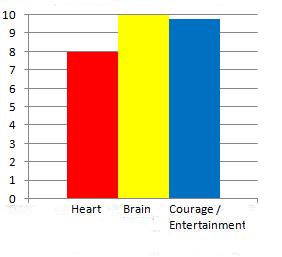
Main Page
Film Festival
______________________________________________________
|






























